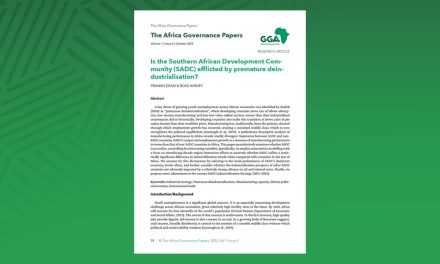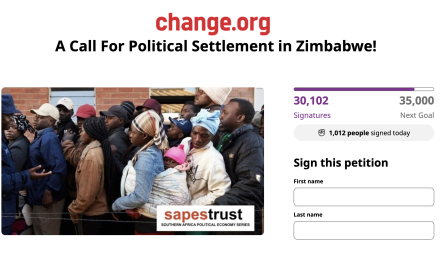
A performance group connected to the Extinction Rebellion group joins hundreds of other people taking part in a protest against the plan by Dutch oil company Shell to conduct underwater seismic surveys along South Africa’s East coast, at Muizenberg Beach, in Cape Town, on 5 December 2021. Photo: Rodger Bosch/AFP
As 2021 drew to a close, environmental and human rights organisations including Border Deep Sea Association, Kei Mouth Ski Boat Club, Natural Justice and Greenpeace Africa, filed an urgent interim interdict in the Makhanda High Court of South Africa to prevent the multinational petroleum company, Shell South Africa (Shell), from conducting an ocean seismic survey scheduled to commence in December 2021.
Offshore seismic surveys involve using sound-waves directed downwards as part of a mapping technique to determine whether oil or gas may be present deep below the seabed of a given area. This process raised concerns about the negative impact of the noise on fish, whales, and other marine life. More in-depth analysis on the impact of seismic survey will follow later in the Wicked Conversation series. Exploration of oil or gas deposits off the coast raised further worries related to sea pollution, climate change, national energy policy and the future development of the region should Shell discover significant quantities of oil and gas.
The initial Shell High Court case presented evidence, from the environmental and human rights organisations, that Shell was required to obtain environmental authorisation before exploration activities commenced, including a seismic survey. The judgement highlights, though, that the detrimental environmental impact of seismic surveys was in fact detailed in the Environmental Management Programme (EMPr) and that implementation of various mitigation measures were accounted for. However, the organisations reported that they did not receive copies of the exploration right, its renewals, or the approval of the EMPr.
Further to this, they stated that they only became aware of the EMPr history upon receiving the October 2021 notice indicating the commencement of the seismic survey in December 2021. On the other hand, Shell stated that the company was fully compliant with the requirements of the EMPr and that it relied on the EMPr compliance audit circulation for public comment. The EMPr was provided to interested and affected parties to check if it was still sufficient and valid for the project.
While the judgment confirms that Shell followed all necessary compliance procedures and initiated channels for public comment, the question of meaningful consultation with all key stakeholders, particularly with the environmental and human rights organisations, in the process of exploration and production activities, remained unanswered. Nonetheless, the court ruled that the organisations failed to show a “well-grounded apprehension of irreparable harm”. Therefore, the organisations’ collective application was dismissed, and Shell was favoured by the High Court upon condition that the company provide details explaining their compliance with the approved EMPr mitigation measures.
Read more hereLeading up to the judgment release, more than 350 000 people signed an online petition objecting to Shell seismic surveys off the Wild Coast. By the end of 2021, over 400 000 people had signed the online petition in addition to affected fishing communities raising their concerns. Subsequently, the court reversed the initial judgment and interdicted Shell from continuing with the seismic survey.
Later in this important Wicked Conversation series, we reflect on the significance of the court’s decision.
Shortly prior to the court cases discussed above, scientists highlighted the possible damage and negative impact that seismic surveys would have on the ocean ecosystem. The seismic blasts, using air guns, produce underwater noise greater than 230 decibels. This negatively affects the marine life that relies on sound as a primary navigation sense in the dark oceanic environment. Therefore, the generation of underwater noise and sound-waves may have significant negative ecological impacts. In addition, research conducted for the fishing industry in South Africa highlighted that seismic surveys may disrupt fast swimming tuna migration flow by forcing them to move on to distant waters. Consequently, few fish are caught, with reductions up to 80% of key economic fisheries in certain regions. This negative impact on ocean productivity has detrimental effects on people that rely on healthy ecosystems for livelihoods and food.
An inconvenient reality is that South Africa remains heavily dependent on coal, oil and gas for its energy needs. Some argue that the discovery of offshore fossil fuel resources may contribute to future energy independence for the country, and enable the South African government to meet its economic developmental goals. This argument, however, appears incompatible with the global transition towards a zero-carbon emissions future, which requires meaningful domestic adoption of the 26th Conference of the Parties (COP26) agreements.
Notably, the Glasgow Climate Pact, agreed at the end of COP26, signified a strengthening of global commitment to accelerate action against climate change and limit global warming to 1.5°C above pre-industrial levels, as noted in the 2015 Paris Agreement.
The South African government made commitments during this COP26 Summit that are now viewed to be inconsistent with the exploration activities of oil and gas off the Wild Coast. Moreover, in the recent Energy Summit gala dinner convened by the South African Youth Economic Council, Minister Gwede Mantashe of the Department of Mineral Resources and Energy, emphasised the “phase down” but not “phase out” of coal. However, this does not negate the fact that South Africa showed the need for a “just transition fund” to enable a low-carbon future without compromising current development priorities.
Ultimately, the commitment to decarbonise value chains, in the interest of enabling healthy livelihoods, sustainable development and protecting the environment, requires responsible and meaningful consultative processes with all stakeholders, while still meeting South Africa’s energy needs today.
[activecampaign form=1]
Busisipho Siyobi is the Programme Head of the Natural Resource Governance Programme at GGA. Prior to joining GGA, she headed up the Corporate Intelligence Monitor desk at S-RM Intelligence and Risk Consulting. Busisipho holds an MPhil in Public Policy and Administration from the University of Cape Town with a research focus on CSR within the South African mining industry. During her Masters, she worked as a research scholar at the South African Institute of International Affairs.












